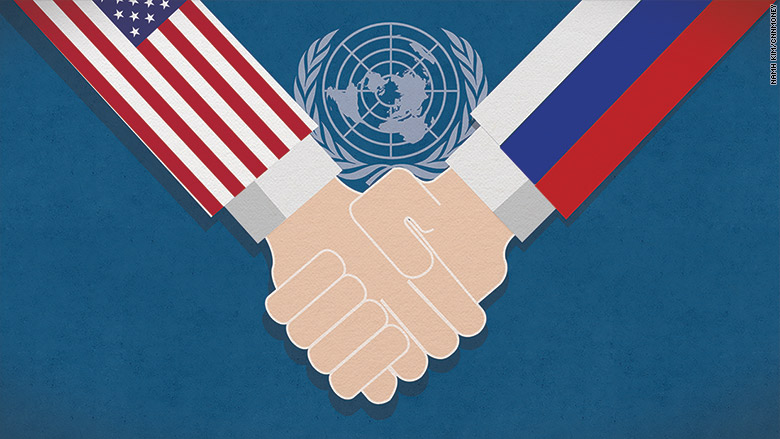
In a rare show of solidarity, the United States and Russia joined forces at the United Nations on Thursday to fight against the flow of money to ISIS terrorists.
The United Nations unanimously adopted a resolution targeting terror financing during a Security Council meeting. Earlier, the United States and Russia proposed the resolution before the U.N. Security Council that places sanctions on ISIS in the same way it previously did to al Qaeda, according to the U.S. Treasury Department.
"Denying [ISIS] access to the international financial system is a key element of any comprehensive strategy to degrade and ultimately destroy it," Samantha Power, the U.S. ambassador to the U.N., said in a statement.
This U.S.-Russia partnership shows that both countries can -- at least in theory -- join together to fight ISIS, even as they are often on opposing sides.
U.S. Treasury Secretary Jacob Lew will lead the first ever U.N. meeting of international finance ministers to discuss how to combat ISIS financing.
"Cutting [the Islamic State] off from the international financial system and disrupting its financing are critical to effectively combating this violent terrorist group," Lew said in a statement. "A united international front is vital to achieve that goal."
The Islamic State is the richest terrorist organization in history. It's largely self-funded, taking in $2 billion last year. Its money is fueled by the people, oil fields and banks under its control.
The new U.N. plan seeks to stem that flow of money. Treasury officials told CNNMoney the resolution also seeks to:
- increase sharing of spy intelligence,
- freeze the bank assets of people identified as members of ISIS,
- implement travel bans on those terrorists,
- create an embargo that blocks weapons from reaching them.
- pressure Syria's neighbors to stop allowing ISIS to smuggle oil across the border and sell it on the black market.
The U.S.-led military coalition is already bombing oil refineries and oil tankers in ISIS-held territory in an attempt to destroy the ISIS oil business.
As of Tuesday, American forces had conducted 78% of the 8,894 air strikes, according to the Pentagon. The other countries taking part in the airstrikes are Australia, Bahrain, Belgium, Canada, Denmark, France, Jordan, the Netherlands, Saudi Arabia, Turkey, the United Arab Emirates and the United Kingdom.
However, oil is just one source of ISIS money. ISIS could make an estimated $800 million in 2015 by taxing and extorting the Iraqis and Syrians in its territory, according to a study by terrorism experts Jean-Charles Brisard and Damien Martinez.
Brisard, who has closely studied ISIS, worries the U.N. plan doesn't go far enough. ISIS is not al Qaeda, which relied on rich donors and kept its money in banks.
"We are fighting ISIS financing with tools applying to a totally different economic model, al Qaeda," Brisard said. "As far as ISIS remains on its current territory, the situation remains the same. Oil revenues are decreasing but ISIS compensates with increased taxes."
The Geneva Centre for Security Policy has documented all sorts of taxes: a 10% income tax, a 10% business tax, 5% on cash withdrawals from banks, and others. There's even a predatory tax on Christians called a jizyah.
The U.N. resolution doesn't target those taxes directly -- it seeks to make it harder for ISIS to store its cash and move it around.
The U.S. Treasury has already identified several ISIS leaders and blacklisted them from the world's financial system. This U.N. resolution intends to strengthen this kind of restriction.
Spain's finance minister, Luis de Guindos Jurado, acknowledged that the U.N. action is only a preliminary step.
"I think we'll have to modify the approach and adjust it to the different sources of revenue," he told CNNMoney at the United Nations. "But the importance is the commitment, the political will. I think it's a very important step, and a clear indication that everyone's involved in fighting this," he said.
Sanctions on ISIS oil sales could also put Turkey in the crosshairs. Russia has accused Turkey's political leaders of allowing ISIS to sneak oil into its territory and personally profiting from this corruption, which Turkey denies.
But Harleen Gambhir, a military scholar at the Institute for the Study of War, said this move by the U.N. would only go so far.
"U.N. member nations can likely make some progress by devoting resources to the finances issue," she said. "But at the end of the day you can't fully solve it without destroying all underground criminal networks, which is nearly impossible."
